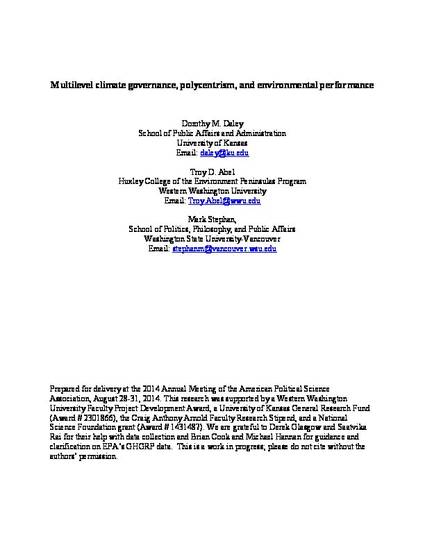
Unpublished Paper
DaleyD_etal_2014_Multilevel_climate_governance_APSA.pdf
(2014)
Abstract
The long-term and large-scale issues stemming from climate change include scientific,
technical, social, and political/policy challenges. In the United States, the political and
governance challenges embedded in climate change are perhaps the most daunting. In the
vacuum of national policies to mitigate and adapt to climate change, subnational arrangements
offer an ideal opportunity to study the ways in which polycentric institutional arrangements may
lead to improved environmental performance. Using the Institutional Analysis and Development
Framework (IAD) we test hypotheses that explore: (1) policy diversity (variety); (2) multilevel
institutional nesting; and their relation to (3) Greenhouse Gas Emission (GHG) reduction
performance while controlling for climate vulnerability. Our analysis capitalizes on a new data
source that provides information on facility level emissions, the Greenhouse Gas Reporting
Program. Recognizing the clustered nature of our data, facilities embedded in states, we rely
upon multilevel modeling to examine the relationships between subnational climate risk
governance and environmental performance. Our results, while preliminary, are encouraging.
Even when controlling for past emissions levels, some aspects of subnational climate risk
governance are associated with better environmental performance.
Keywords
- Climate Policy,
- Climate Risk,
- Environmental Governance
Disciplines
Publication Date
2014
Citation Information
Dorothy Daley, Troy D. Abel and Mark Stephan. "DaleyD_etal_2014_Multilevel_climate_governance_APSA.pdf" (2014) Available at: http://works.bepress.com/troy_abel/22/
